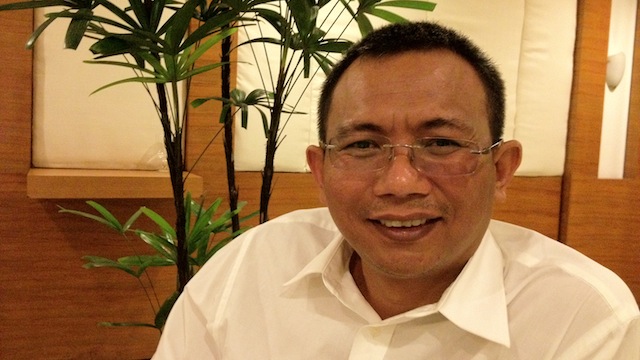SUMMARY
This is AI generated summarization, which may have errors. For context, always refer to the full article.
MANILA, Philippines – Environmentalist and social entrepreneur Ambrosius Ruwindrijarto dreams of an Indonesia where someday the forests will be managed not by logging companies but by the people.
In this bright future he envisions, the jungles will be protected from illegal lumberjacks and administered in a sustainable way so that the landowners will also be able to live well from its resources.
He may sound naive, but so far Ruwindrijarto’s success in battling the logging companies in his country has made him a recipient of the 2012 Ramon Magsaysay Award.
Giving forests back to the indigenous peoples
In an interview with Rappler, Ruwindrijarto stressed that Indonesia is the third highest emitter of greenhouse gases after China and the United States — precisely due to deforestation.
“What we are doing is battling deforestation by campaigning against illegal logging, against forest conversion into other uses like mining and palm plantations, and by giving the management of the forests back to the indigenous peoples,” he said.
These communities, noted the environmentalist, “have been managing the forests for thousands of years” so they should be the ones in charge of ruthless logging companies that just want to extract the timber.
Ongoing struggle
Despite the recent success of his organization Telapak, it has not been easy for Ruwindrijarto.
“In Eastern Kalimantan (an Indonesian province on the island of Borneo) today, as we speak, bulldozers are destroying the forests of the indigenous peoples that are part of our organization, so it is also a battle for our own survival.”
Ruwindrijarto admitted that sometimes they feel “like this is too big a battle to fight” especially in a corrupt country where many influential politicians are involved in the illegal logging business.
But everyday, he said, “there is hope and accomplishments, especially with community groups and indigenous peoples who are every day fighting for their own life to keep their identity as forest peoples, protect their forests and improve their livelihoods.”
Eco-friendly, sustainable logging
Despite his activism, Ruwindrijarto is actually not against logging.
What he opposes is the indiscriminate exploitation of the forests of Indonesia, which, in 2007, was recognized by the Guinness Book of World Records as the country with the fastest deforestation rate on the planet.
He is pushing for logging concessions to be returned to indigenous peoples who inhabit the forests and to teach these communities to benefit from the resources but in an eco-friendly and sustainable way, via cooperatives.
Can this work? Ruwindrijarto is convinced it is.
“Many of our communities are now living well and doing good business in a sustainable way for the forests, and some have even obtained international eco-friendly certificates. They are the pioneers, and I hope that others follow their example,” he told Rappler.
‘Working relationship’ with government
When he started to campaign against illegal logging, Ruwindrijarto clashed with many officials, but over the years, he managed to develop a working relationship with most.
“Our relationship has evolved. From not knowing each other, now we know each other and now we know for sure that not everyone in the government is bad or corrupt. Maybe a few of them yes, but there are many public officials who are committed to conservation and social justice, and we hope they will be able to get more colleagues to join in the movement.”
He also has high hopes for Tepalak’s projects in far-flung West Papua, a province rich in natural resources but terribly undeveloped and neglected by Jakarta.
“We are struggling, we are working there. Papua is different because it is far from our base, but it is also the last frontier; most of the forests are still there,” said Rudindrijarto. – Rappler.com
Add a comment
How does this make you feel?

There are no comments yet. Add your comment to start the conversation.